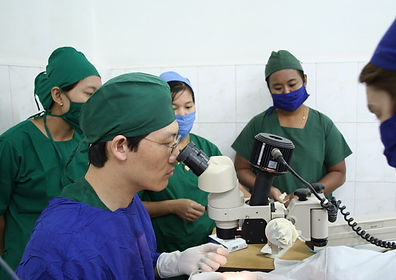PROFILE
Overseas Volunteer Work
Myanmar Eye Care Project
Myanmar Eye Care Project
(www.myanmareye.org) was started by Dr Geoffrey Cohn, an ophthalmologist based in Sydney with a long history of volunteer and charity work in ophthalmology. Dr Kang joined the program in 2003, as a senior ophthalmology trainee at Prince of Wales Hospital. Myanmar Eye Care Project is run by a group of Australian ophthalmologists.
Myanmar (formerly Burma) is a nation of 60 million people and has one of the world’s highest published rates of blindness. There are only around 200 ophthalmologists in service for the entire country, and not all of the ophthalmologists are qualified to perform surgery. In contrast, Australia has approximately 800 ophthalmologists serving a population of 24 million. Although the situation is improving, access to medical care is still limited by availability and cost.
Myanmar Eye Care Project began with a small group of Australian ophthalmologists making trips to Wachet Hospital to offer free eye care to disadvantaged people of Myanmar. Along with consultation and clinic procedures, surgery was offered for cataract, glaucoma, squint, oculoplastics and trauma. In 2009, modern anaesthetic care was introduced and is continually being upgraded. This allowed safe care of children and patients who suffered trauma. Dr Kang introduced vitreoretinal surgery to Wachet Hospital 2010, with the help of colleagues and generous donations from private individuals and companies. Phacoemulsification, which is the modern technique of performing cataract surgery, was introduced at the same time. The program has evolved to an initiative aimed at training and equipping local ophthalmologists in the field of vitreoretinal surgery and phacoemulsification. In the meantime, Myanmar Eye Care Project has expanded to include multiple sites, providing treatments to 30,000 patients a year.
In 2014, an outbreak of endophthalmitis (internal eye infection) occurred at Wachet Hospital, leading to many patients losing sight. The increased workload and higher complexity of modern surgical procedures were identified as contributing factors, and the need to upgrade the sterilisation facilities became dire. Fortuitously, Myanmar Eye Care Project was recognised for its work by XOVA (Excellence in Ophthalmology Vision Award) program and was provided with the funding to upgrade the sterilisation equipment and aseptic workflow. A new centralised sterilisation department was created and equipped with new autoclaves, and the theatre staff was trained in modern aseptic techniques, with the work being completed in March 2016.
To be successful and sustainable, volunteer programs need to consider many, often conflicting, factors. A doctor giving up time to offer free service is a good start, but the program will cease to exist when he or she is no longer able to visit. The program can truly become sustainable when there is transfer of skills and knowledge, and the local doctors are equipped sufficiently to work in the absence of visiting doctors. Merely buying an equipment is not enough – both the local doctors and support staff need to be trained in its proper use, and sufficient resources provided to maintain the equipment. All work needs to be carried out within the government regulations and in harmony with the local doctors who already practice in the region. A local economic model must develop to sustain the medical industry so that healthcare in the country can eventually be independent of external help. All of these aims require considerable effort and resources.

Team visiting Myanmar

Myanmar is still a poor country with under-developed healthcare system

Consulting during early years of Myanmar Eye Care Project

Surgery when Myanmar Eye Care Project started

Newly equipped ophthalmic theatre in Wachet Hospital

Wachet Hospital now has the nation's most advanced sterilisation department

View of Wachet Hospital from Irrawaddy River

Patients of Myanmar

Training of local ophthalmologists in the use of laser

Enormous enthusiasm from local ophthalmologists for training in vitreoretinal surgery

Grateful patients after surgery
Dr Kang has been involved in Myanmar Eye Care Project since 2003. He currently travels to Wachet Jivitadana Sangha Hospital, near Mandalay, three times a year to train the local eye specialists in vitreoretinal surgery. He organised the upgrading of sterilisation services in Wachet Hospital using the funds received from XOVA award, following an outbreak of eye infection in 2014. It must be acknowledged that many ophthalmologists, nurses and engineers have given their time and resources to make the program the success it is today. They all deserve recognition equally for their generous work.